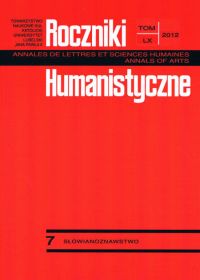The Figure of Cassandra in the Dramatic Interpretation by Lesya Ukrainka and in the Poetic Reading by Wisława Szymborska
Abstract
This paper marks an attempt to compare the literary figure of Cassandra in Polish and Ukrainian literature, as exemplified by the poetic drama Kasandra [Cassandra] by Lesya Ukrainka and by the poem Monolog dla Kasandry [A Monologue for Cassandra] by Wisława Szymborska. In terms of literary interpretation, the Ukrainian example falls far closer to classical mythology than the Polish counterpart. This fact can be interpreted as a manifestation of cultural transformations and revaluations that recurred in the tragic 20th century. The interpretation of the classical models that came later in time and that is more attractive for a contemporary reader often leads to the reversal of the primary senses planned by the authors. This problem is of more general nature and has to do with the general status quo of present-day European culture.
Постать Касандри в драматичній інтерпретації Лесі Українки і ліричному прочитанні Віслави Шимборської
У статті зроблено спробу порівняти постать Касандри в польській і українській літературах на прикладі поетичної драми Лесі Українки Касандра та вірша Віслави Шимборської Монолог для Касандри. Український твір є більш класичним прочитанням міфологічного взірця ніж вірш польської поетеси. Це можна тлумачити впливом культурних перетворень і переосмислення цінностей, що відбулося протягом ХХ століття, оскільки обидва тексти з моменту їх створення розділяє більше шістдесяти років. Ближчі до нас за часом прочитання класичних зразків інколи повністю змінюють їхні первинні значення, що обумовлено змінами культурних парадигм європейської культури, а також зміною перспективи досвіду людини.
Copyright (c) 2012 Roczniki Humanistyczne

This work is licensed under a Creative Commons Attribution-NonCommercial-NoDerivatives 4.0 International License.





